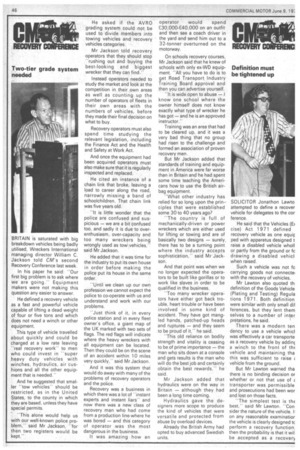Two-tier grade system needed
Page 48

If you've noticed an error in this article please click here to report it so we can fix it.
BRITAIN is saturated with big breakdown vehicles being badly utilised, Wreckers International managing director William C. Jackson told CM's second Recovery Conference last week.
In his paper he said Our first big problem is to ask where we are going.'" Equipment makers were not making this question any easier to answer.
He defined a recovery vehicle as a fast and powerful vehicle capable of lifting a dead weight of four or five tons and which does not need a winch or other equipment.
This type of vehicle travelled about quickly and could be charged at a low rate leaving "real recovery work" to men who could invest in -super heavy duty vehicles with winches, hydraulics, air cushions and all the other equipment that is needed."
And he suggested that smaller "tow vehicles" should be restricted, as in the United States, to the county in which they are based, unless they have special permits.
"This alone would help us with our well-known police problem," said Mr Jackson, "for then two registers would be kept." He asked if the AVRO grading system could not be used to divide members into towing vehicles and recovery vehicles categories.
Mr Jackson told recovery operators that they should stop "rushing out and buying the best-looking and biggest wrecker that they can find."
Instead operators needed to study the market and look at the competition in their own areas as well as counting up the number of operators of fleets in their .own areas with the numbers of vehicles, before they made their final decision on what to buy.
Recovery operators must also spend time studying the relevant legislation, including the Finance Act and the Health and Safety at Work Act.
And once the equipment had been acquired operators must also make sure that it is regularly inspected and replaced.
He cited an instance of a chain link that broke, leaving a load to career along the road, narrowly missing a band of schoolchildren. That chain link was five years old.
"It is little wonder that the police are confused and suspicious — we are a bit confused too, and sadly it is due to overenthusiasm, over-capacity and too many wreckers being wrongly used as tow vehicles," said Mr Jackson.
He added that it was time for the industry to put its own house in order before making the police put its house in the same order.
"Until we clean up our own profession we cannot expect the police to co-operate with us and understand and work with our problems.
"Just think of it, in every police station and in every fleet owner's office, a giant map of the UK marked with two sets of flags. The red flags will indicate where the heavy wreckers with all equipment can be located. Then they could be on the scene of an accident within 10 miles very quickly," said Mr Jackson.
And it was this system that would do away with many of the problems of recovery operators and the police.
Recovery was a business in which there was a lot of "'instant experts and instant liars" and now there was a new class of recovery man who had come from a production line.where he was bored — and this category of operator was the most dangerous in the business.
It was amazing how an operator would spend £30,000-C40,000 on an outfit• and then see a coach driver in the yard and send him out to a 32-tonner overturned on the motorway.
On schools recovery courses, Mr Jackson said that he knew of schools with only ex-WD equipment. "All you have to do is to get Road Transport Industry Training Board approval and then you can advertise yourself.
It is wide open to abuse — I know one school where the owner himself does not know exactly what type of wrecker he has got and he is an approved instructor."
Training was an area that had to be cleared up, and it was a very bad thing that no group had risen to the challenge and formed an association of proven recovery men.
But Mr Jackson added that standards of training and equip ment in America were far worse than in Britain and he had spent some time teaching the Americans how to use the British airbag equipment.
"What other industry has relied for so long upon the principles that were established some 30 to 40 years ago?
'The country is full . of mechanically-driven or power wreckers which are either used for lifting or towing and are of basically two designs — surely, there has to be a turning point where the industry accepts sophistication,'" said Mr Jackson.
And that point was when we no longer expected the opera tors to be built like gorillas or to work like slaves in order to be qualified in the business.
''Too many wrecker operators have either got back tro uble, heart trouble or have been involved in some kind of accident. They have got mang led hands, patched-up heads and ruptures — and they seem to be proud of it," he said.
-This old reliance on bodily strength and vitality is ceasing
to be of prime importance — the man who sits down at a console and gets results is the man who will do the best job and certainly obtain the best rewards," he said.
Mr Jackson added that hydraulics were on the way in Britain — although they had been a long time coming.
Hydraulics gave the designers more scope to produce the kind of vehicles that were versatile and protected from abuse by overload devices.
Already the British Army had opted to buy advanced Swedish units.




















































































































































